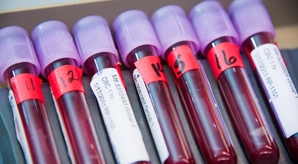Clinical Pathology Laboratory
Tests We Perform
Although we perform many tests, the following are the most common tests that our laboratory provides:
Diagnostic Profile
Commonly referred to as a "panel," our diagnostic profile measures the following components:
- alananine aminotransferase (ALT): elevated in liver disease
- albumin: altered in dehydration, gastrointestinal, and liver and kidney diseases
- alkaline phosphatase: can detect liver (biliary) and some endocrine diseases
- amylase: helpful in diagnosing pancreatic disease
- calcium: can detect parathyroid, bone, and chronic renal disease, and is elevated in some cancers
- creatinine: elevated in kidney disease
- globulin: high concentration of this can indicate chronic inflammation or a certain type of cancer
- glucose: increased in diabetes and decreased in starvation, severe infection, severe liver disease and certain cancers
- phosphorous: increased in kidney disease
- potassium: increased in severe kidney disease and hypoadrenocorticism; decreased in starvation, vomiting and diarrhea, and chronic kidney disease
- total bilirubin: increased in liver disease and hemolysis, and in prolonged anorexia in horses and cows
- total protein: can indicate dehydration, kidney, liver disease, metabolic disorders, and nutritional disorders
- blood urea nitrogen: increased in kidney disease and dehydration, decreased in severe liver disease
Complete Blood Count (CBC)
A CBC evaluates the number of circulating white and red blood cells and platelets. This test can be useful to identify infection, anemia, adequate blood cell production, and certain types of cancers.
Urinalysis
Assessing the health and function of the urinary system can help detect urinary tract diseases, liver failure, and hemolysis.
Coagulation Testing
This is a test that investigates coagulation factors (also referred to as blood clotting factors). Low or absent factors indicate the cause of bleeding disorders. This testing often is performed if a patient has excessive bleeding or prolonged bruising.
Cytology
Cytology focuses on the investigation of disease processes by examining tissue samples microscopically. Cells are evaluated individually under high magnification with the purpose of diagnosing types of inflammation, infectious agents, types of cancer, or other tissue abnormalities. Often, cytology can guide the next diagnostic step in patient evaluation.
Coombs Testing
This tests for IgG antibodies, which can bind to red blood cells when a patient has diseases such as autoimmune hemolytic anemia.
Cross-Matching/Blood Typing
Blood typing determines blood type by identifying proteins on the surface of blood cells. Cross-matching finds compatible blood types for situations such as blood transfusions.
Blood Gas Analysis
Blood gas analysis measures the partial pressure of oxygen and carbon dioxide, as well as the pH, in the blood
Special Testing
We offer additional special tests including: Fructosamine, Bile Acids, Ethylene Glycol, b-HBA, Non-esterified fatty acids, and Osmolality.

